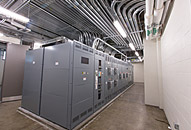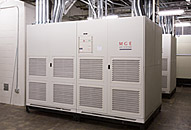Richmond, VA 23233
(804) 527-1600
Approach
Ensuring Consistently Excellent Results
Phase I: Needs Analysis / Options Evaluation
This is the fundamental and most important phase. Here the owner has the opportunity to see and understand the many options that define the potential uptime availability and efficiency of various infrastructure designs. It also provides the services necessary to provide the capacity planning that defines required space, electrical and mechanical capacities, to support current and future requirements. Then this capacity planning information and availability options are assigned “real world” costs. With this information, an owner now can evaluate his options and has the ability to properly invest in a data center that can support his needs, as well as determine what investment in risk avoidance is appropriate.
Phase II: Project Scope / Cost Estimate
Once decisions have been made on capacity and redundancies, an appropriate Project Scope and Cost Estimate document can be prepared. This document is a list of “line items” which is inclusive of everything needed to design, construct, and commission this project, including all equipment, contractors and services. Each line item details the scope of a single piece of equipment, contractor or service, and assigns it an estimated cost. Summing all line items provides a complete and detailed estimated total cost of the project.
Phase III: Preparation of Construction Documents / Bid Process / Final Cost
Specifications for major equipment systems are produced, and submitted to the appropriate vendors for pricing. Bids are received, validated, then submitted to the owner for his review and selection. Then the estimated cost for each equipment line item is replaced with the selected equipment cost. Then construction documents are prepared by our in-house architecture and engineering services, using the actual equipment that has been selected. These documents are then submitted to multiple contractors of each discipline necessary (ie., General, Electrical, Mechanical, Fire Suppression, etc.) for bidding. Bids are received, validated, then submitted to the owner for his review and selection. Then the estimated cost for each contractor line item is replaced with the selected contractor cost. This process defines the actual, final cost of the project.
Phase IV: Construction / Commissioning
With all equipment and contractor trades selected, Facility Support, Inc. (Class A VA General Contractor, Unlimited General Contractor in NC) is the General Contractor, purchasing / furnishing the major equipment, and contracting directly with the selected sub-contractors to perform their portions of the project. Once the project is constructed, Facility Support provides the testing and commission services to ensure all equipment and subcontractor work performs as specified, and verifies all of the interrelated systems work as designed.
Phase V: Management of Maintenance and Emergency Services
All of the infrastructure systems require regular, scheduled preventive maintenance (PM) to provide the function they are expected to; as well as to comply with Code, regulatory and auditing requirements. Facility Support has a complete division dedicated to:
- 24 x 7 monitoring of these systems
- Scheduling and coordinating PM activities with the respective PM vendor and owner
- Supporting the PM activities, to ensure they don’t compromise the production systems they support
- Responding to any unscheduled issues that may occur, and managing the subsequent remediation and resolution of the issues



Copyright © Facility Support Inc. All Rights Reserved.
